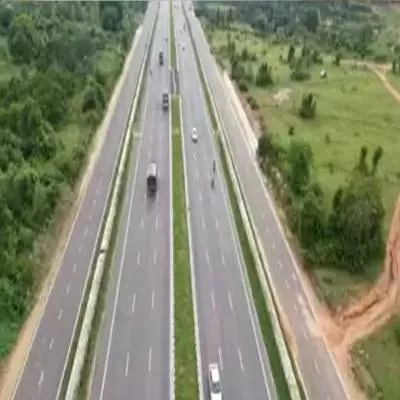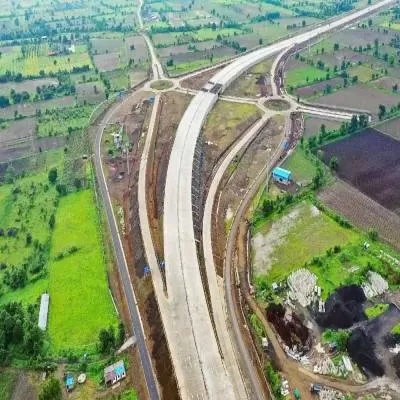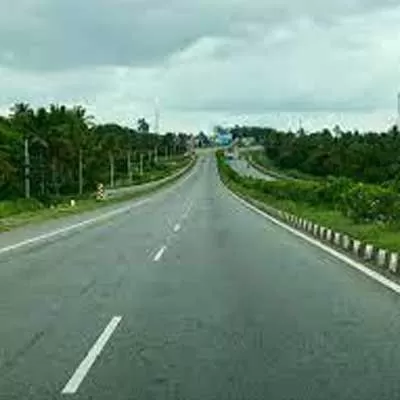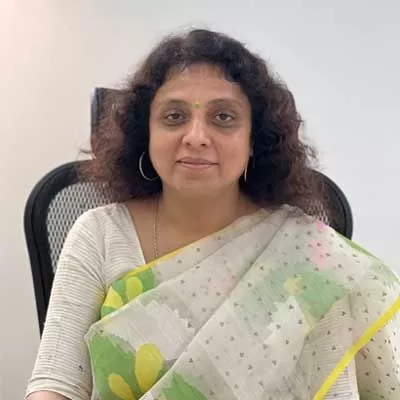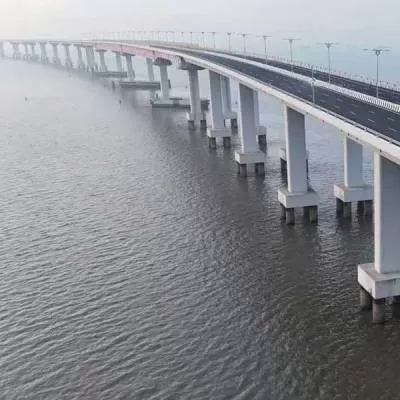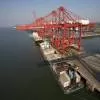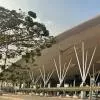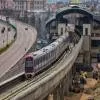- Home
- Infrastructure Transport
- ROADS & HIGHWAYS
- MCC has proposed to set up a 100 tpd C&D waste management unit on the PPP model

MCC has proposed to set up a 100 tpd C&D waste management unit on the PPP model
Karnataka´s second largest city, Mysuru is the city of palaces and a popular travel destination in India.
It also enjoys the ranking of the cleanest city under the Swachh Bharat Abhiyan. G Jagadadeesh, Commissioner, Mysuru City Corporation (MCC), elaborates upon the factors that contributed to this achievement and other upcoming infrastructure projects in the city with CW.
In terms of cleanliness, what can other cities in India learn from Mysuru?
Here are some initiatives taken by MCC to keep the city clean:
Solid waste management: All households and commercial establishments in 65 wards are covered under door-to-door collection of waste. MCC has distributed two colour-coded bins to 150,000 households. The corporation collects wet waste everyday and dry waste twice a week from each house. Zone-wise training for all pourakarmikas has been imparted on source segregation and reduction of waste. Mysuru was declared an Open Defecation Free City by the Quality Council of India on September 27, 2016.
Underground drainage: The underground drainage system of Mysuru has a century-old history. The network covers 98 per cent of the area, and the city has a network of over 1,560 km with 60,000 manholes and 205,000 sanitary house services linked to the network.
Slaughter house waste: The 165 chicken stalls in MCC limits are chain-linked and monitored through GPS. Plans are ahead to construct a modern abattoir in the city. GPS-based fleet management: A GPS-integrated vehicle tracking system, installed on the vehicle, helps calculate its precise location on earth. This information is then transmitted with the help of a GSM module to a centralised server with other vehicle parameters. About 352 vehicles are fitted with GPS devices. The number of trips, fuel consumption, collection of waste and driver attendance are regularly monitored.
Please elaborate on the corporation´s initiatives and achievements in solid waste management?
MCC focuses mainly on the four´R´ principle:
Refuse un-segregated waste at source and penalise those littering outside.
Reduce at source using new technologies and following best practices. Apartments or hotels or choultries and bulk generators are coming forward to have their own solid waste management units. Individual households convert organic waste into compost or biogas and use it for their own purposes.
Recycle.
Reuse.
The corporation ensures that door-to-door collection is implemented in all 65 wards by 620 labours. Secondary collection is done through 255 single-compartment containers and 130 four-compartment containers are placed in 65 wards. And then, there is treatment and disposal (composting). Further, a compost plant of 200-250 tonne capacity, located near Vidyaranyapuram, was established in 2001 under an ADB project and has been outsourced to IL&FS for O&M on a PPP basis.
A major development in recent times is making eight zero waste management units functional in eight zones of MCC in which about 45-50 MT waste per day is processed. Garbage sorting and shredding machines of 10 TPD are installed to optimise the capacity of the units. These units are decentralised, cost-effective, energy-efficient and environmentally sound and labour-friendly, are a sustainable enterprise and have high resource recovery. The remaining waste is being dumped in the capping area. Bio-culture is being sprayed on a day-to-day basis.
Also, 3 acre for a landfill has been operational since 2012; about 90-125 tpd of rejects come from the compost plant. And, the zero waste management plant is land-filled everyday, and by the end of the day, it is covered by soil. Further, the district collector has conducted meetings with all district-level officers to strictly ban and discourage plastic usage. Additionally, dry waste collection centres have been set up in all 65 wards and 37 rag pickers identified for plastic waste management. In fact, MCC has used every platform to educate people on cleanliness and segregation of waste at source. And, as part of the corporation´s future plans to keep Mysuru clean, MCC has proposed to set up a 100 tpd C&D waste management unit on the PPP model. The tendering process is complete and a work order will be issued shortly. Plans are also being laid to set up a new composting facility for 100 tpd at Rayanakere and 200 tpd at Kesare using segregated wet waste components from the city.
Tell us about the intelligent transport system (ITS) introduced by the city.
With ITS, we can provide real-time information to the public and it allows monitoring and tracking of a fleet of buses on real time. It covers core systems such as a vehicle tracking system, real-time passenger information system and a central control station.
The corporation is planning improvements to bulk water supply system under AMRUT...
Under the JNNURM scheme, MCC has converted 47 district metering area (DMA) distribution networks into 24 x 7.
The balance 22 DMAs need to be modified for 24 x 7 along with water balance and bulk supply improvement.
This project has been envisaged at Rs 156 crore.
Tell us about the key infra projects undertaken.
- Roads: The total road network length in the city is 1,850 sq km. Roads are rebuilt or improved under special grants under the corporation budget.
- Solar: MNRE, New Delhi, has declared Mysuru city a ´Model Solar City´ under the development of the Solar City programme. Five renewable energy projects under ´development of solar cities´ have been approved to install 196 kW of solar rooftop. New projects of 16 kW have been completed and one project of 45 kW is nearing completion. Tenders for two - ie, 45 kW and 60 kW - are awarded and work will commence shortly. Drainage: There are six valleys in the city. Of these, two valleys - Bannimantap valley and Hebbel valley - are improved under JNNURM funds at Rs 125 crore. The remaining four valleys need to be improved.
- Sewerage: MCC has constructed three facultative aerated lagoon-type sewage treatment plants of 157.6-mld capacity with seven wet wells housed with adequate capacity pumping machineries. The bio-culture method has been adopted.
- Streetlights: There are 62,310 street lights that include high mast, metal halide, sodium repairs, tube light and LED.
- There are 2,959 switching points managed in 27 outsourced packages, which include repair and replacement of bulbs.
- A tender document to correct this system into LED and web-based management has been sent to the government for approval.
What is the annual budget planned for the city? How much of this comes from the corporation, state, Centre or any other agencies?
The annual budget planned for MCC during 2016-17 is Rs 81,137.46 lakh. Of this, the receipts will be as follows:
Opening balance (CB of 2015-16) - Rs 14,134.01 lakh
From corporation revenue - Rs 30,198.22 lakh
Grants or funds from the state - Rs 30,490.88 lakh
Grants from the Centre - Rs 6,314.35 lakh
Total - Rs 81,137.46 lakh
Mysuru Municipal Corporation
Total city area: 128 sq km
Population: 938,380
Year of establishment: July 18, 1862
Municipal councillor: 65 elected representatives and five nominated
Annual budget: Rs.850 crore
To share your views on this city, write in at feedback@ConstructionWorld.in
- G Jagadadeesh, Commissioner, Mysuru City Corporation Karnataka´s second largest city, Mysuru is the city of palaces and a popular travel destination in India. It also enjoys the ranking of the cleanest city under the Swachh Bharat Abhiyan. G Jagadadeesh, Commissioner, Mysuru City Corporation (MCC), elaborates upon the factors that contributed to this achievement and other upcoming infrastructure projects in the city with CW. In terms of cleanliness, what can other cities in India learn from Mysuru? Here are some initiatives taken by MCC to keep the city clean: Solid waste management: All households and commercial establishments in 65 wards are covered under door-to-door collection of waste. MCC has distributed two colour-coded bins to 150,000 households. The corporation collects wet waste everyday and dry waste twice a week from each house. Zone-wise training for all pourakarmikas has been imparted on source segregation and reduction of waste. Mysuru was declared an Open Defecation Free City by the Quality Council of India on September 27, 2016. Underground drainage: The underground drainage system of Mysuru has a century-old history. The network covers 98 per cent of the area, and the city has a network of over 1,560 km with 60,000 manholes and 205,000 sanitary house services linked to the network. Slaughter house waste: The 165 chicken stalls in MCC limits are chain-linked and monitored through GPS. Plans are ahead to construct a modern abattoir in the city. GPS-based fleet management: A GPS-integrated vehicle tracking system, installed on the vehicle, helps calculate its precise location on earth. This information is then transmitted with the help of a GSM module to a centralised server with other vehicle parameters. About 352 vehicles are fitted with GPS devices. The number of trips, fuel consumption, collection of waste and driver attendance are regularly monitored. Please elaborate on the corporation´s initiatives and achievements in solid waste management? MCC focuses mainly on the four´R´ principle: Refuse un-segregated waste at source and penalise those littering outside. Reduce at source using new technologies and following best practices. Apartments or hotels or choultries and bulk generators are coming forward to have their own solid waste management units. Individual households convert organic waste into compost or biogas and use it for their own purposes. Recycle. Reuse. The corporation ensures that door-to-door collection is implemented in all 65 wards by 620 labours. Secondary collection is done through 255 single-compartment containers and 130 four-compartment containers are placed in 65 wards. And then, there is treatment and disposal (composting). Further, a compost plant of 200-250 tonne capacity, located near Vidyaranyapuram, was established in 2001 under an ADB project and has been outsourced to IL&FS for O&M on a PPP basis. A major development in recent times is making eight zero waste management units functional in eight zones of MCC in which about 45-50 MT waste per day is processed. Garbage sorting and shredding machines of 10 TPD are installed to optimise the capacity of the units. These units are decentralised, cost-effective, energy-efficient and environmentally sound and labour-friendly, are a sustainable enterprise and have high resource recovery. The remaining waste is being dumped in the capping area. Bio-culture is being sprayed on a day-to-day basis. Also, 3 acre for a landfill has been operational since 2012; about 90-125 tpd of rejects come from the compost plant. And, the zero waste management plant is land-filled everyday, and by the end of the day, it is covered by soil. Further, the district collector has conducted meetings with all district-level officers to strictly ban and discourage plastic usage. Additionally, dry waste collection centres have been set up in all 65 wards and 37 rag pickers identified for plastic waste management. In fact, MCC has used every platform to educate people on cleanliness and segregation of waste at source. And, as part of the corporation´s future plans to keep Mysuru clean, MCC has proposed to set up a 100 tpd C&D waste management unit on the PPP model. The tendering process is complete and a work order will be issued shortly. Plans are also being laid to set up a new composting facility for 100 tpd at Rayanakere and 200 tpd at Kesare using segregated wet waste components from the city. Tell us about the intelligent transport system (ITS) introduced by the city. With ITS, we can provide real-time information to the public and it allows monitoring and tracking of a fleet of buses on real time. It covers core systems such as a vehicle tracking system, real-time passenger information system and a central control station. The corporation is planning improvements to bulk water supply system under AMRUT... Under the JNNURM scheme, MCC has converted 47 district metering area (DMA) distribution networks into 24 x 7. The balance 22 DMAs need to be modified for 24 x 7 along with water balance and bulk supply improvement. This project has been envisaged at Rs 156 crore. Tell us about the key infra projects undertaken. Roads: The total road network length in the city is 1,850 sq km. Roads are rebuilt or improved under special grants under the corporation budget. Solar: MNRE, New Delhi, has declared Mysuru city a ´Model Solar City´ under the development of the Solar City programme. Five renewable energy projects under ´development of solar cities´ have been approved to install 196 kW of solar rooftop. New projects of 16 kW have been completed and one project of 45 kW is nearing completion. Tenders for two - ie, 45 kW and 60 kW - are awarded and work will commence shortly. Drainage: There are six valleys in the city. Of these, two valleys - Bannimantap valley and Hebbel valley - are improved under JNNURM funds at Rs 125 crore. The remaining four valleys need to be improved. Sewerage: MCC has constructed three facultative aerated lagoon-type sewage treatment plants of 157.6-mld capacity with seven wet wells housed with adequate capacity pumping machineries. The bio-culture method has been adopted. Streetlights: There are 62,310 street lights that include high mast, metal halide, sodium repairs, tube light and LED. There are 2,959 switching points managed in 27 outsourced packages, which include repair and replacement of bulbs. A tender document to correct this system into LED and web-based management has been sent to the government for approval. What is the annual budget planned for the city? How much of this comes from the corporation, state, Centre or any other agencies? The annual budget planned for MCC during 2016-17 is Rs 81,137.46 lakh. Of this, the receipts will be as follows: Opening balance (CB of 2015-16) - Rs 14,134.01 lakh From corporation revenue - Rs 30,198.22 lakh Grants or funds from the state - Rs 30,490.88 lakh Grants from the Centre - Rs 6,314.35 lakh Total - Rs 81,137.46 lakh Mysuru Municipal Corporation Total city area: 128 sq km Population: 938,380 Year of establishment: July 18, 1862 Municipal councillor: 65 elected representatives and five nominated Annual budget: Rs.850 crore To share your views on this city, write in at feedback@ConstructionWorld.in


